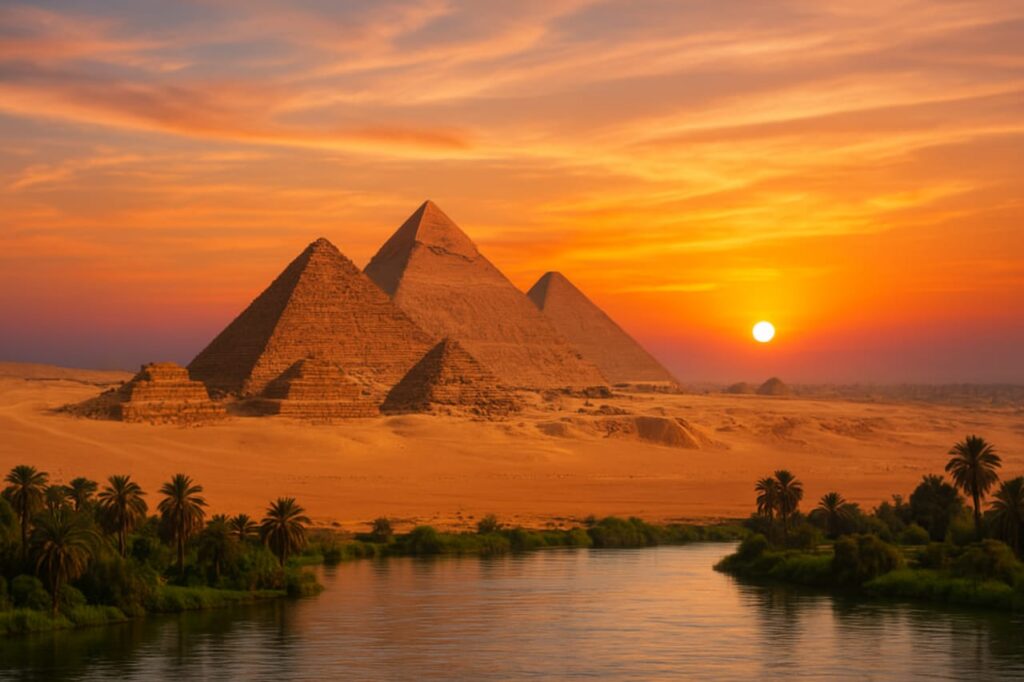Egypt at a Glance – Your Gateway to Timeless Wonders
Egypt is not just a destination – it’s the heartbeat of Africa and the crossroads of civilizations. For thousands of years, this land has captured the imagination of travelers, historians, and dreamers. Today, it remains a crown jewel of world tourism, inviting millions each year to explore its ancient treasures, vibrant culture, and breathtaking landscapes.
General Information
Official Name: Arab Republic of Egypt
Nick Name: The Gift of the Nile
Time Zone: Eastern European Time (UTC +2:00)
Calling Code: +20
Official Language: Arabic
Other Common Languages: English and French (widely spoken in tourism and business)
Area: 1,010,408 km²
Population: 110,000,000 (2025 estimate)
Location: Between 22° and 32° N latitude, and 25° and 35° E longitude
A Brief Journey Through History
Egypt is home to one of the oldest and most remarkable civilizations in the world. The Pharaonic era gave rise to architectural wonders like the Pyramids of Giza and the temples of Luxor and Karnak, setting a standard for human achievement that remains unmatched. Over centuries, Egypt witnessed the influence of the Greeks, Romans, Arabs, Ottomans, and British, each leaving their mark on its culture, architecture, and traditions. Today, Egypt’s tourism industry is booming, offering travelers a chance to walk through 5,000 years of history while enjoying modern hospitality.
Geography
Egypt is a transcontinental nation, strategically connecting Africa and Asia via the Suez Canal. It shares borders with Libya, Sudan, Israel, and the Gaza Strip, and is surrounded by the Mediterranean Sea to the north and the Red Sea to the east. Its lifeline, the Nile River, flows from south to north, bringing life to the desert and sustaining civilizations for millennia.
Must-Visit Cities in Egypt
Egypt’s cities are as diverse as its history, each offering its own charm:
Cairo – A bustling metropolis and the gateway to Egypt’s past, home to the Egyptian Museum, Islamic architecture, and vibrant bazaars like Khan El Khalili.
Giza – World-famous for the Great Pyramids and the Sphinx, Giza is where you meet the grandeur of Ancient Egypt face-to-face.
Luxor – Often called the world’s greatest open-air museum, Luxor is home to the Valley of the Kings, Temple of Hatshepsut, and Karnak Temple Complex.
Alexandria – Founded by Alexander the Great, this Mediterranean city blends Greek, Roman, and Egyptian heritage with landmarks like the Bibliotheca Alexandrina and Citadel of Qaitbay.
Aswan – A serene Nile-side city, known for Philae Temple, Nubian culture, and as the gateway to Abu Simbel.
The Nile River – Egypt’s Lifeline
The Nile River is more than just a body of water; it is Egypt’s heart and soul. From felucca,exploring the river is a must-do experience that offers a unique perspective on Egypt’s landscapes and history.
Egypt’s Oases – Desert Paradise
Hidden within Egypt’s vast deserts are its magical oases, such as Siwa, Bahariya, Farafra, and Dakhla – each offering lush landscapes, hot springs, and unique cultural experiences.
Desert Adventures
Egypt’s deserts are perfect for safari tours, dune bashing, and stargazing. The Sahara Desert and Sinai Desert provide endless opportunities for exploration, from ancient caravan routes to Bedouin encampments under the stars.


